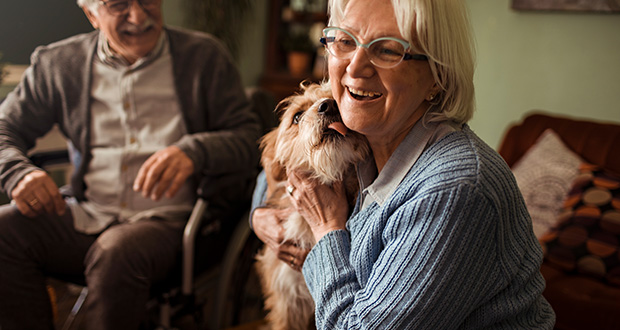Project uses pets to curtail loneliness in aged care

A new programme is exploring how human-animal interactions can scale down loneliness and social isolation in older people and those from intergenerational and intercultural backgrounds.
Researchers in the pilot study 'Pets and People' use domesticated animals, including dogs, birds and rabbits, to foster human bonds and possibly fight off loneliness.
Particularly people in aged care and those from different cultural and generational backgrounds are at higher risks of social isolation due to language and age barriers.
Monash University's Dr Em Bould has been exploring the value of the human-pet relationship for over six years and said pets are 'great conversation starters.'
"Often, when you bring groups of people together that don't know each other, pets are a social lubricant," Bould said.
"They can form that bridge and help start those conversations.
"It's important to have regular social interactions and to stay connected – it can improve physical and mental health and wellbeing."
Loneliness and social isolation adversely affect someone's physical and mental health, and risk factors increase as we age.
Aside from human-to-human interaction, pets have shown great potential as substitutes in curtailing these negative health outcomes.
Bould already found in previous work that animal-assisted activities, such as dog walking, can be the 'perfect icebreaker' and promote social connection.
"The program's ultimate aim is to use pets to support social connection and healthy ageing," Bould said.
"And we're really letting the pets do most of the work and bring people together, so hopefully, it can help cure loneliness and social isolation."
The programme will run in four aged care homes using face-to-face interaction and online mainstream tablet technologies like iPads.
It's part of the 13 National Centre for Healthy Ageing projects that are federally funded and in partnership with Monash University and Peninsula Health.
Bould plans to enrol volunteers in May next year to help provide low-cost animal-assisted activity groups in the aged care homes.
"Pets will be the key focus of the meetings."
"So, it could be that participants have conversations about past or current pets, sharing photos of them, as well as activities involving the animals.
"They might also be present at meetings, or residents could make items for pets or local animal shelters."
Email: [email protected]






Another round of “great idea” times I see. Isn’t there anymore in aged care over twenty years of age. This isn’t new, while from the outside it seems easy this has been done and failed time and again yet it gets wheeled out as a new idea. Ground breaking!
The falls risk to frail residents increases dramatically, tripped on a lead or skid on a puddle are among the risks and when this occurs it puts a risk on staff and workers compensation claims etc.
I love the idea and have done this year’s ago and the risks are real, of course another obstacle is the department of health. If an accident does occur by implementing this idea the department will absolutely flog the facility. It will be in the paper and the connotation will be that the facility was negligent. Reality is sad.